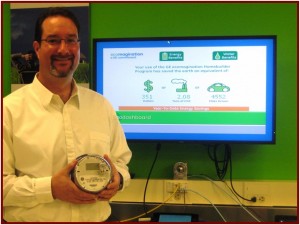
"Initially the small numbers of electric vehicles will not strain the grid;” however, there are a number of potential issues that must be studied and quantified, such as whether clusters of electric vehicles will tax the local electrical distribution system, including transformers," said Nielsen.
GE and Nissan have signed a two-year research agreement today that is supposed to speed up the development of a smart charging infrastructure to help encourage broader adoption of electric vehicles or EVs such as the Nissan Leaf.
With more than an estimated 25% of the world’s electricity generated or distributed by GE equipment, GE has a vested interest in not only encouraging more EVs but understanding their effect on power generation. GE signed a Memorandum of Agreement back in April with Nissan, which led to today’s deal.
In a statement, GE and Nissan said they have targeted areas for the research efforts. The first is the integration of electric vehicles with homes and buildings. The second looks at electric vehicle charging and the future impact on the grid once (it’s hoped) millions of electric cars are on the road.
In the U.S. several problems are inhibiting widespread adoption of EVs: the high cost of the EV itself even with lavish taxpayer subsidies, which are unsustainable given current deficits; the generation of 50% of electricity in the U.S. by carbon monoxide producing coal, the dirtiest of carbon based fossil fuels; and the lack of a national grid to move power around during peak demand periods.
“As the U.S. and world move toward electric vehicles, the automotive sector is forming new industry connections that extend well beyond the traditional OEM space,” said Mark Little, Senior Vice President and Director, GE Global Research. “One of the biggest connections being made is with companies that generate and provide electricity. As a major provider of power generation equipment and energy services, GE is in a great position to help the automotive industry bring millions of electric vehicles onto the grid.”
Several projects around the two focus areas already are underway. In one project, researchers from the companies are studying how electric cars can be incorporated into GE’s overall concept for a “Smart Home.” Nissan engineers are developing methods to connect the vehicle to the home, making it a more integrated part of the building’s energy equipment. This project will look at how the addition of an electric car impacts the cost of electricity and changes overall home electricity loads.
In another study, researchers will use aggregate usage data along with simulation and modeling experiments, to analyze the effect millions of electric cars could have on our electrical distribution system.
GE’s work will be conducted primarily at its global research operations in Niskayuna, New York. Nissan Technical Center North America, located in Farmington Hills, Michigan will lead the automaker’s efforts, including integration of vehicle-to-home charging technology, with support from the Nissan Advanced Technology Center in Japan.

